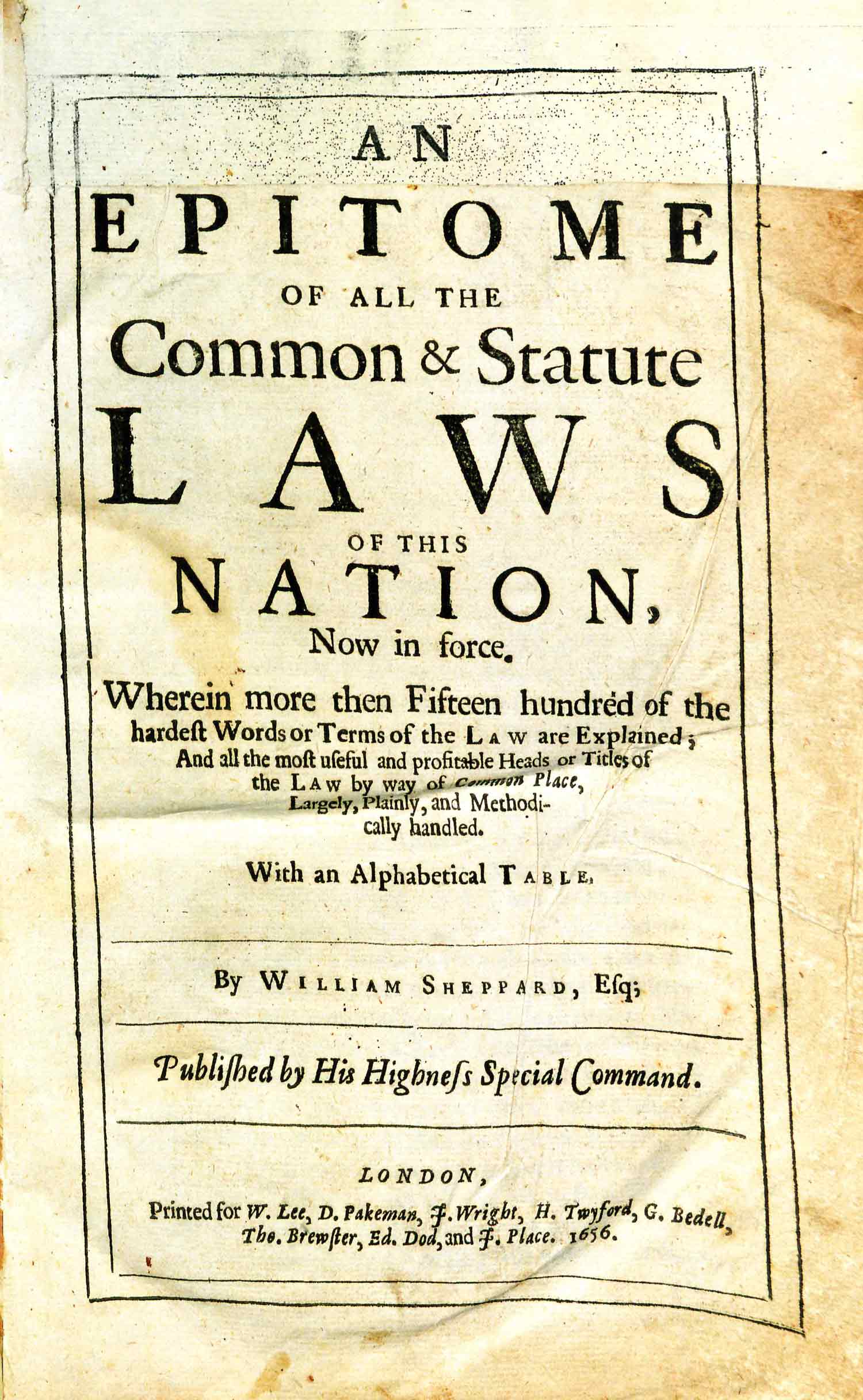An Epitome of All the Common & Statute Laws of this Nation Now in Force
by William Sheppard
| An Epitome of All the Common & Statute Laws of This Nation Now in Force | |
|
Title page from An Epitome of All the Common & Statute Laws of This Nation Now in Force, George Wythe Collection, Wolf Law Library, College of William & Mary. | |
| Author | William Sheppard |
| Published | London: Printed for W. Lee, D. Pakemann, F. Wright, H. Twyford, G. Bedell, Tho. Brewster, Ed. Dod, and F. Place |
| Date | 1656 |
| Language | English |
| Pages | 12, 1131 |
| Desc. | Folio (29 cm.) |
| Location | Shelf F-1 |
In 1653 Sheppard was called to London by Oliver Cromwell to assist him in the creation of a law reform program.[3] Some experts believe that both Sheppard’s religious and legal publications were the ultimate for his selection.[4] During Sheppard's three years with Cromwell he published nine texts in support of the administration’s agenda.[5] Some of his best known works during this period included Precedent of Precedents, which contained standardized forms to register land, and An Epitome of All the Common and Statute Laws of the Nation now in Force, which was one of the earliest attempts at an abridged legal encyclopedia.[6]
Evidence for Inclusion in Wythe's Library
Dean's Memo[7] includes the 1656 edition of Sheppard's Epitome based on Alan Smith's assertion that Thomas Jefferson cites the work in his handbook.[8] The Brown Bibliography[9] lists the first edition (1675) of The Grand Abridgment of the Common and Statute Law of England based on notes in Jefferson's commonplace book.[10] Jefferson studied law under Wythe from 1762 to 1767, so the entries from the mid 1770s may not reflect Wythe's influence. Brown also notes that this work is based upon Sheppard's earlier work, An Epitome of all the Common and Statute Laws of this Nation, Now in Force. No conclusive evidence proves which edition Wythe may have owned, or, indeed, that he owned either. The Wolf Law Library followed Dean's recommendation and purchased the 1656 edition of An Epitome of All the Common & Statute Laws of this Nation Now in Force.
Description of the Wolf Law Library's copy
Bound in contemporary calf with blind rules to boards. Rebacked in period style with raised bands and lettering pieces. Original head of title page missing and replaced by modern period-style copy. Includes marginalia throughout volume and a loose inscription, possibly removed from one of the original pastedowns. Purchased from The Lawbook Exchange, Ltd.
View the record for this book in William & Mary's online catalog.
See also
References
- ↑ Nancy L. Matthews, "Sheppard, William (bap. 1595, d. 1674)" in Oxford Dictionary of National Biography, accessed October 10, 2013.
- ↑ Ibid.
- ↑ Nancy L. Matthews, William Sheppard, Cromwell's Law Reformer (Cambridge: Cambridge University Press, 1984), 31.
- ↑ Matthews, “Sheppard, William."
- ↑ Ibid.
- ↑ "Tarlton Law Library - Law Dictionary Collection - online exhibit," Tarlton Law Library, The University of Texas at Austin, accessed October 10, 2013, http://tarlton.law.utexas.edu/exhibits/dictionaries/common_law/sheppard.html.
- ↑ Memorandum from Barbara C. Dean, Colonial Williamsburg Found., to Mrs. Stiverson, Colonial Williamsburg Found. (June 16, 1975), 14 (on file at Wolf Law Library, College of William & Mary).
- ↑ Alan McKinley Smith, "Virginia Lawyers, 1680-1776: The Birth of an American Profession" (PhD diss., The Johns Hopkins University, 1967), 263.
- ↑ Bennie Brown, "The Library of George Wythe of Williamsburg and Richmond," (unpublished manuscript, May, 2012, rev. 2014) Microsoft Word file. Earlier edition available at: https://digitalarchive.wm.edu/handle/10288/13433.
- ↑ The Commonplace Book of Thomas Jefferson: A Repertory of His Ideas on Government, ed. Gilbert Chinard (Baltimore, MD: The Johns Hopkins Press, 1926), 352.


